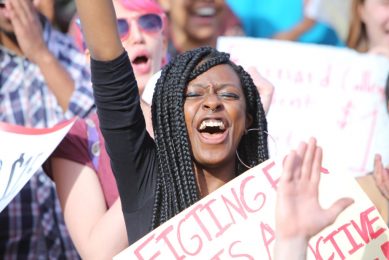Overview
This unit asks you to consider the permissible restrictions schools can place on students’ freedom of speech, as they learn about the (fictional, but realistic) case of Davis v. Ann Arbor School Board. You will either conduct a mock negotiation in which they will try to resolve a First Amendment-related conflict between a student and his public high school, or a mock argument in which you will argue for one side in front of a panel of student judges.
Unit Questions
- How are students’ free speech rights protected in a public school environment?
- To what extent can public school officials exercise discipline and control over a student’s speech without infringing on the First Amendment?
- What role do negotiations play in the legal process and how can parties use negotiation to resolve conflict without trial?
- How do court arguments work in the legal process?
Lesson 1: Are schools permitted to limit students’ First Amendment freedom of speech?
Lesson 1: Are schools permitted to limit students’ First Amendment freedom of speech?
Lesson 2: Under what circumstances may a school punish student speech?
Lesson 2: Under what circumstances may a school punish student speech?
Lesson 3: How does the law apply to our case?
Lesson 3: How does the law apply to our case?
Lesson 4: What are the key elements of negotiation?
Lesson 4: What are the key elements of negotiation?
Lesson 5: How can parties use negotiation to achieve the best solution?
Lesson 5: How can parties use negotiation to achieve the best solution?
Lesson 6: Is negotiation an effective tool in the legal process?
Lesson 6: Is negotiation an effective tool in the legal process?
Lesson 7: What is a mock argument?
Lesson 7: What is a mock argument?
Lesson 8: How do I prepare for a mock argument?

